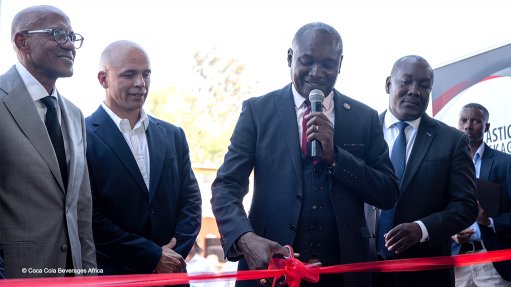World Bank, DBSA report highlights local SDG requirements
Closing South Africa’s Sustainable Development Goals (SDGs) gap will require significant infrastructure and related spending, informed by the right objectives and relevant metrics, a joint study by the World Bank and the Development Bank of Southern Africa (DBSA) shows.
The report, titled ‘Going Beyond the Infrastructure Funding Gap – A South African Perspective’ and published on January 31, quantifies the spending needed in education, transport and water and sanitation to achieve the related SDGs.
The United Nations adopted the SDGs in 2015 as a universal call to action to end poverty, protect the planet and ensure that all people enjoy peace and prosperity by 2030.
South Africa’s commitment to the SDGs is embodied in the National Development Plan Vision 2030.
While progress has been made, the study notes that South Africa has significant work ahead to achieve the SDGs. According to the 'Sustainable Development Report 2022', South Africa ranks 113 out of 161 countries in terms of its performance in the 17 SDGs.
The study also notes that South Africa needs to spend between R4.8-trillion and R6.2-trillion – equating to between $254-billion and $329-billion – on transport, water and sanitation, basic education and technical and vocational education and training between 2022 and 2030 to close the SDGs gap in these sectors.
The figures for infrastructure spending are equivalent to spending between 8.7% and 11.2% of gross domestic product a year on average. The study asserts that the solution is not always to spend more, but to spend better on the right objectives, with the use of relevant metrics.
The study also highlights the infrastructure cost drivers and the implications of different policy choices. In addition, the sectoral analyses present detailed results on the spending needs under several scenarios and recommendations to close the gap.
“Infrastructure is required to support the progress towards the 2030 SDG agenda. Education, electricity, water and sanitation, and transport infrastructure are required to improve access to basic services and support inclusive economic growth.
“This innovative study contributes to the evidence-based body of knowledge, towards understanding the service gap, and the ambitions of each sector, in determining where investments should be made,” says World Bank South Africa country director Marie Francoise Marie-Nelly.
“Closing the SDG gap will require significant infrastructure and related spending. In addition to the sectoral analyses, this study provides an assessment of the exposure of infrastructure assets to natural hazards and the investment needs to increase their resilience. Our joint study further provides a macroeconomic analysis, which examines the growth implications of the proposed spending and the projected funding gap,” says DBSA CEO Boitumelo Mosako.
Achieving the SDGs requires adequate infrastructure in various sectors, the study notes, which includes good quality school and college facilities to support student outcomes.
Reliable transportation infrastructure and affordable services are also essential for people to access basic services and job opportunities, allowing firms to stay competitive and create better jobs.
Further, it involves establishing high-quality water and sanitation infrastructure to provide affordable and safe services.
Lastly, resilient infrastructure is essential for sustainable progress towards the SDGs, ensuring long-lasting and environmentally responsible development.
A key finding of the study reveals that poor quality and management of infrastructure and services undermine the achievement of SDGs.
Thus, investing in infrastructure must be supported by proper management, maintenance and good governance, it argues.
Comments
Press Office
Announcements
What's On
Subscribe to improve your user experience...
Option 1 (equivalent of R125 a month):
Receive a weekly copy of Creamer Media's Engineering News & Mining Weekly magazine
(print copy for those in South Africa and e-magazine for those outside of South Africa)
Receive daily email newsletters
Access to full search results
Access archive of magazine back copies
Access to Projects in Progress
Access to ONE Research Report of your choice in PDF format
Option 2 (equivalent of R375 a month):
All benefits from Option 1
PLUS
Access to Creamer Media's Research Channel Africa for ALL Research Reports, in PDF format, on various industrial and mining sectors
including Electricity; Water; Energy Transition; Hydrogen; Roads, Rail and Ports; Coal; Gold; Platinum; Battery Metals; etc.
Already a subscriber?
Forgotten your password?
Receive weekly copy of Creamer Media's Engineering News & Mining Weekly magazine (print copy for those in South Africa and e-magazine for those outside of South Africa)
➕
Recieve daily email newsletters
➕
Access to full search results
➕
Access archive of magazine back copies
➕
Access to Projects in Progress
➕
Access to ONE Research Report of your choice in PDF format
RESEARCH CHANNEL AFRICA
R4500 (equivalent of R375 a month)
SUBSCRIBEAll benefits from Option 1
➕
Access to Creamer Media's Research Channel Africa for ALL Research Reports on various industrial and mining sectors, in PDF format, including on:
Electricity
➕
Water
➕
Energy Transition
➕
Hydrogen
➕
Roads, Rail and Ports
➕
Coal
➕
Gold
➕
Platinum
➕
Battery Metals
➕
etc.
Receive all benefits from Option 1 or Option 2 delivered to numerous people at your company
➕
Multiple User names and Passwords for simultaneous log-ins
➕
Intranet integration access to all in your organisation

















